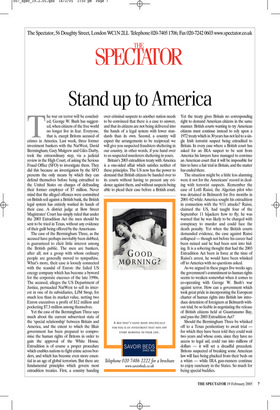Stand up to America
The war on terror will be concluded, George W. Bush has suggested, when citizens of the free world no longer live in fear. Everyone, that is, except Britons accused of crimes in America. Last week, three former investment bankers with the NatWest, David Bermingham, Gary Mulgrew and Giles Darby, took the extraordinary step, via a judicial review in the High Court, of asking the Serious Fraud Office (SFO) to investigate them. They did this because an investigation by the SFO presents the only means by which they can defend themselves before being extradited to the United States on charges of defrauding their former employer of $7 million. Never mind that the alleged offences were committed on British soil against a British bank, the British legal system has entirely washed its hands of their case. A district judge at Bow Street Magistrates’ Court has simply ruled that under the 2003 Extradition Act the men should be sent to be tried in Texas, without any evidence of their guilt being offered by the Americans.
The case of the Bermingham Three, as the accused have perhaps inevitably been dubbed, is guaranteed to elicit little interest among the British public. The men are bankers, after all; not a group with whom ordinary people are generally moved to sympathise. What’s more, their case is loosely connected with the scandal of Enron: the failed US energy company which has become a byword for the corporate excesses of the late 1990s. The accused, alleges the US Department of Justice, persuaded NatWest to sell its interest in one of its subsidiaries, LJM Swap, for much less than its market value, netting two Enron executives a profit of $12 million and pocketing $7.3 million among themselves.
Yet the case of the Bermingham Three says much about the current subservient state of the ‘special relationship’ between Britain and America, and the extent to which the Blair government has been prepared to compromise the human rights of Britons in order to gain the approval of the White House. Extradition is of course a proper procedure which enables nations to fight crime across borders, and which has become even more essential in an age of global terrorism. But there are fundamental principles which govern most extradition treaties. First, a country handing over criminal suspects to another nation needs to be convinced that there is a case to answer, and that its citizens are not being delivered into the hands of a legal system with lower standards than its own. Second, a country will expect the arrangements to be reciprocal: we will give you suspected fraudsters sheltering in our country, in other words, if you hand over to us suspected murderers sheltering in yours.
Britain’s 2003 extradition treaty with America is a one-sided affair which satisfies neither of these principles. The US now has the power to demand that British citizens be handed over to its courts without having to present any evidence against them, and without suspects being able to plead their case before a British court. Yet the treaty gives Britain no corresponding right to demand American citizens in the same manner. British courts wanting to try American citizens must continue instead to rely upon a 1972 treaty which in 30 years has not led to a single Irish terrorist suspect being extradited to Britain. In every case where a British court has asked for an IRA suspect to be sent from America his lawyers have managed to convince an American court that it will be impossible for him to have a fair trial in Britain, and the matter has ended there.
The situation might be a little less alarming were it not for the Americans’ record in dealing with terrorist suspects. Remember the case of Lotfi Raissi, the Algerian pilot who was detained in Belmarsh for five months in 2001–02 while America sought his extradition in connection with the 9/11 attacks? Raissi, claimed the US, had taught four of the September 11 hijackers how to fly; he was warned that he was likely to be charged with conspiracy to murder and could face the death penalty. Yet when the British courts demanded evidence, the case against Raissi collapsed — though not before his career had been ruined and he had been sent into hiding. It is a sobering thought that had the 2003 Extradition Act been in force at the time of Raissi’s arrest, he would have been whisked off to America with no questions asked.
As we argued in these pages five weeks ago, the government’s commitment to human rights seems to weaken somewhat when it comes to co-operating with George W. Bush’s war against terror. How can a government which took great pride in incorporating the European charter of human rights into British law introduce detention of foreigners at Belmarsh without trial, be so feeble in negotiating the release of British citizens held at Guantanamo Bay, and pass the 2003 Extradition Act?
Should the Bermingham Three be whisked off to a Texas penitentiary to await trial for which they have been told they could wait two years and whose costs, since they have no access to legal aid, could run into millions of dollars — it will set a dreadful precedent. Britons suspected of breaking some American law will face being plucked from their beds on a whim — while IRA gun-runners continue to enjoy sanctuary in the States. So much for being special buddies.

















































 Previous page
Previous page